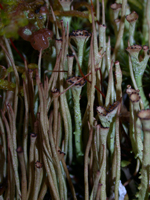
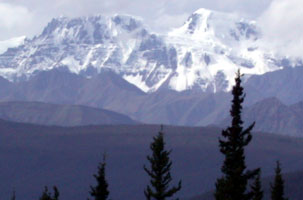
Tundra Lichen / The Icefield Ranges
Field Biology and Field Geology of the Northern North America Cordillera (Alaska - Canadian Highway), Alaska, Yukon Territory, British Columbia , Canada.
"The TORCH workshop that I participated in British Columbia has been invaluable. The staff is a remarkable combination of
brilliance, experience, scientific knowledge, and cultural understanding.
To be immersed in this unique environment has enriched my professional
and personal life. Already I have developed and presented two workshops
using inquiry and environmental themes from this workshop. The Hesquiaht
First Nations perspectives and a western science grounding are combined
in a setting that is absolutely breathtaking. This is an international
learning and service experience not to be missed."
Jean Carpenter
Outreach Coordinator, Center for Life Sciences, Colorado State University
Expedition Updates
Required Personal Clothing and Gear
National Science Teaching Standards
To Pay Share of Cost (SOC) by Credit Card
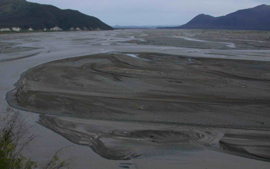
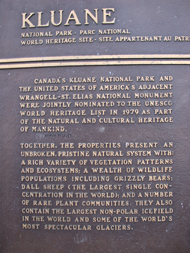
Brilliant Braided Rivers / Kluane World Heritage Site
August 15 -22 , 2005
Participant Share of Cost: A comprehensive course fee of $1100. Rolling Admissions. $150 non-refundable deposit
The Environmental Learning Institute provides course transport from the Fairbanks, Alaska rendezvous to Seattle-Tacoma Airport, on-course travel, food, cooking equipment, lodging, protected area fees, course reader and all scientific and research equipment.
†This fee does not include airfare from the participantís home to Fairbanks and from Seattle-Tacoma Airport, personal clothing, personal equipment expenses, personal expenses or optional travel.
PLEASE LET US KNOW IF YOU WOULD LIKE TO COMMUNICATE WITH PREVIOUS PARTICIPANTS!
Rendezvous: 0900 Hours AM, August 15, Fairbanks, Alaska.
Dropoff: 2000 Hours PM, 22 August Seattle-Tacoma Airport, Washington State. Therefore you can book flights for the next morning.
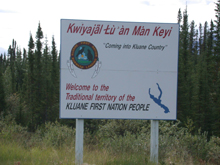
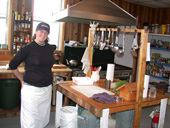
Entering Kluane First Nations Territory/ The Kitchen and Chef at the Arctic Research Institute
1. Facilitator Contact Information:
David Scott Silverberg, Ph.D.,
520 731-3374, silverberg@alum.mit.edu
Environmental Learning Institute
Sennen Charleson, Victoria, B.C.
2. Brief Description:
The Alaska-Canada Highway traverses remarkable boreal or taiga forests, temperate evergreen forests and tundra environments. It is connector between North America's far northwest and the US Pacific northwest, while also an important corridor for Canadian and First Nations travel and commerce. The entire length we travel straddles the Western Cordillerra mountain ranges, range after range after range, with abundant wildlife, magnificent forests and wild rivers. Heading east and south from Fairbanks Alaska we will visit the Tatlin National Wildlife Refuge, the Kluane National Park and Reserve, the Arctic Research Institute, and many of the remarkable Canadian and First Nation's protected areas along the ALCAN and it's brilliant "spur" the Cassiar Highway.
Teachers will:
- Study and work with First Nations, and begin an understanding of First Nation's inquiry processes and traditional ecological knowledge.
- Learn about the climate, flora, fauna, and geology of this section of the North American Cordillerra..
- Become familiar with global and local threats to these ecosystems.
- Learn the Grinnel system of field journaling.
- Learn a variety of field research techniques that can be applied in the classroom as well as in the field with their students.
- Experience inquiry-based learning first-hand and develop inquiry-based lessons for their own classrooms.
- co-design and co-implement a Participatory Action Research project (with geological and biological components) serving the interests of a local First Nations community.
- Be encouraged to establish long-term professional connections with
each other and local experts.
- Participate in professional forums on inquiry-based science, alternative assessment, and constructivist pedagogy in the science classroom.
- Contribute to the creation of a world wide web site that will illustrate the philosophy, pedagogy and experiences of the workshop.
3. Itinerary:
The 8-day institute will be spent traveling to and from and staying in the Clayoquot Sound Biosphere Reserve, Vancouver Island, British Columbia, Canada. The group will fly to Seattle, Washington and then take a study tour enroute to the Clayoquot Sound Biosphere Reserve.
15 August Fairbanks 0900 Hours AM rendezvous; gear check, buy supplies and head to Tatlin National Wildlife Refuge, arrive late afternoon
16 August Drive to Kluane National Park and Preserve, Yukon Territory, Stay at the Arctic Research Institute
17-22 August Drive south towards Seattle visiting Canadian protected areas and First Nations communities enroute.
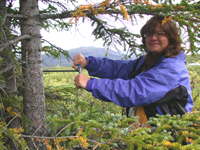
Dendrochronology in the Taiga/Boreal Forest
4. Levels of educator-participants:
We invite intermediate- to secondary-level pre-service, in-service, education undergrad and graduate student, science education professors (teacher of teachers) and science education professionals (e.g. science education coordinators, university, park, museum and outdoor center affiliated).
5. Structure of workshop:
We will travel east along the Alaska Highway to it's intersection with the cassiar Highway. The Alaska Highway is now entirely paved. At it's junction with the cassiar Highway we will take the Cassiar Highway which is still about one-third good gravel road. For those eight days, participants will attend content
lectures and guided hikes, undertake field studies in both taiga-boreal forest, tundra and temperate evergreen ecosystems. Our days are filled with study-touring, field work, our evenings include
lively text-based discussions of inquiry-based learning, expeditionary
learning, team development models, global environmental change.
6. Content Knowledge Topics: Field Geology and Field Biology in the Context of Natural Ecosystems and Ecological Concepts
This course provides an overview of the taiga-boreal, temperate evergreen and tundra ecosystems: what they are; how they work from a geological and biological perspective; and how they evolve and adapt to change. Ecosystem structure and function, as well as ecosystem development and dynamic equilibrium are integrated into a central theme of sustainability from a local and global perspective. Particular emphasis will be given to the ecology of the western cordillerra, the system of protected areas, the local communities. Biosphere, lithosphere, atmosphere interactions and exchanges within the cordillerra and interior arctic to temperate biomes are introduced as related to issues of local and global environmental change. The philosophy, pedagogy and learning activities of the course employ a standards- and inquiry-based approach.
Learning Activity Topics Include:
Environmental history of Canada and Alaska
Canada and global environmental change
Experimental design and data interpretation
Watersheds and environmental change
Tectonic, geologic and physical geographic development of the cordillerra in Alaska and Yukon-British Columbia, Canada
Glacial geomorphic processes
Biogeochemical cycles in the taiga forests
Causes and consequences of biodiversity
Taiga, tundra, temperate evergreen forest structure & function
Habitat fragmentation and degradation
Canada's protected areas and communities
7. Curriculum materials:
Each participant will also receive a binder in which to put all course
handouts. Included will be readings on global change and current environmental
issues in temperate forest and coastal ecosystems, both global and local.
Maps and field guides for each field site as well as descriptions of common
field techniques and their applications will also be included. In addition,
teachers will receive handouts regarding pedagogy, ways in which inquiry
based learning may be implemented in the classroom, alternative assessment
(rubrics, portfolios, exhibitions), and constructivism in science education.
8. Field Equipment: Our field lab includes several notebook computers, and standard geological and biological field equipment. A digital projector, compasses, barometers, digital cameras, mini-DV camcorders, 35 mm SLR, dissecting microscope, GPS units.
9. Food and Lodging: We will be cooking in a camp and also occassionally eating in simple local restaurants. Participants will be asked to help the camp manager with cooking and cleaning chores in rotation. We will be camping in tents and using sleeping bags. You need to bring your own sleeping bag and sleeping pad. Two person tents are provided, though you are welcome to bring your own if you prefer.
10. Physical Fitness Requirements: The ALCAN TORCH course involves hiking in the wet tundra and taiga and temperate forest, dayhiking with a 20 pound daypack, hiking on trails and off-trails, traveling in a van for 5-8 hours/day on often curvy mountain roads.† Participants will sleep in tents, in sleeping bags with sleeping pads on the ground.†